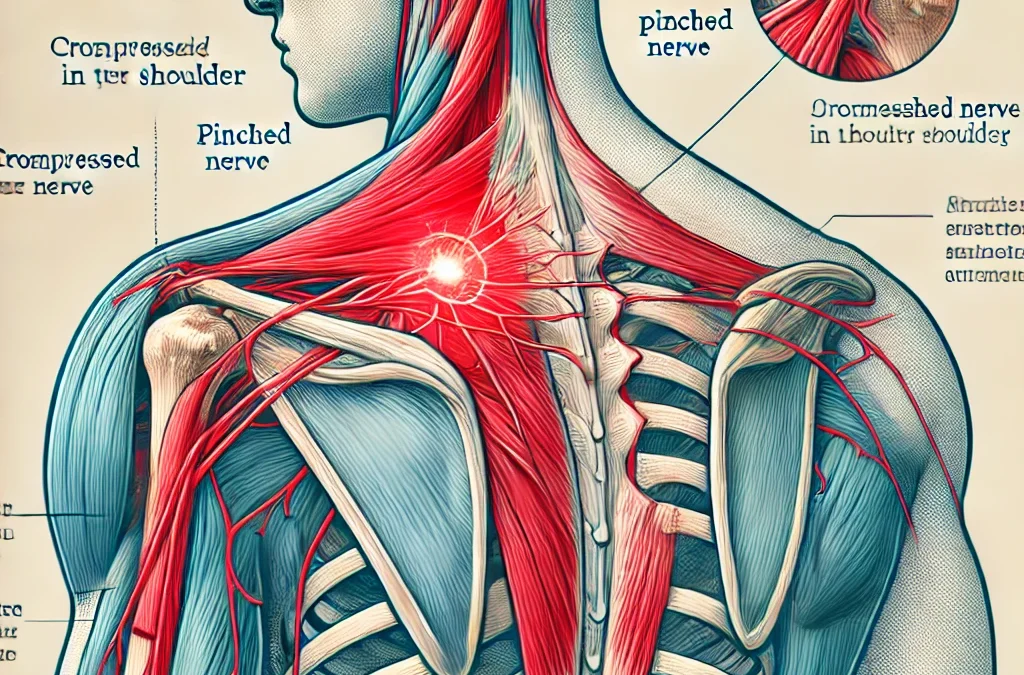Pinched Nerve in the Shoulder – Symptoms, Treatments and Resources
Overview of a Pinched Nerve in the Shoulder
A pinched nerve in the shoulder occurs when surrounding tissues, such as muscles, tendons, or bones, apply too much pressure on a nerve. This condition can cause significant discomfort, numbness, and even limited mobility in the affected area. Understanding the symptoms, causes, and treatments can help you manage this condition effectively and prevent future occurrences.
Symptoms of a Pinched Nerve in the Shoulder
The symptoms can vary depending on the severity of the compression and the specific nerve affected, but common signs include:
- Pain: Sharp, shooting, or burning pain that may radiate from the shoulder down the arm.
- Numbness or Tingling: A sensation similar to “pins and needles,” often felt in the shoulder, arm, or fingers.
- Weakness: Reduced strength in the shoulder, arm, or hand, which can make gripping or lifting objects difficult.
- Limited Mobility: Stiffness and difficulty moving the shoulder or arm comfortably.
- Muscle Spasms: Involuntary tightening or cramping of the muscles in the shoulder area.
Causes of a Pinched Nerve
- Poor Posture: Slouching or hunching can place excess stress on the neck and shoulder area.
- Repetitive Motion: Overuse of the shoulder through repetitive movements can lead to nerve compression.
- Injuries: Trauma, such as a fall or sports injury, can compress nerves.
- Herniated Disc: A bulging or slipped disc in the cervical spine can press on shoulder nerves.
- Bone Spurs: Overgrowth of bone, often due to arthritis, can narrow nerve pathways.
- Tight Muscles: Overdeveloped or tense muscles can squeeze nerves.
Diagnosing a Pinched Nerve
- Physical Examination: A doctor will assess your symptoms, range of motion, and any areas of tenderness.
- Imaging Tests:
- X-rays: To detect bone spurs or structural abnormalities.
- MRI: Provides detailed images of soft tissues, including nerves and muscles.
- CT Scan: Offers a cross-sectional view of the shoulder area.
- Nerve Conduction Studies: Tests to measure how well electrical signals travel through the nerve.
Treatment Options
1. At-Home Remedies
- Rest: Avoid activities that aggravate the condition.
- Ice and Heat Therapy:
- Apply ice packs for 15-20 minutes to reduce inflammation.
- Use heat packs to relax tense muscles.
- Over-the-Counter Pain Relievers: Nonsteroidal anti-inflammatory drugs (NSAIDs) like ibuprofen or acetaminophen can help alleviate pain.
- Posture Correction: Use ergonomic chairs and maintain a neutral spine alignment.
2. Physical Therapy
A physical therapist can create a personalized exercise program to:
- Strengthen shoulder and neck muscles.
- Improve flexibility and range of motion.
- Teach proper posture and movement techniques.
3. Medical Treatments
- Corticosteroid Injections: Reduce severe inflammation and pain.
- Muscle Relaxants: Alleviate tension and spasms.
4. Surgery
If conservative treatments fail and symptoms persist for several months, surgical options such as decompression or nerve release may be recommended.
Preventing a Pinched Nerve in the Shoulder
- Practice Good Ergonomics:
- Use supportive chairs and proper desk setups.
- Take frequent breaks from repetitive activities.
- Exercise Regularly: Strengthen the muscles around the shoulder and neck.
- Stretch Daily: Incorporate stretches that target the shoulders and upper back.
- Avoid Overloading the Shoulder: Use proper lifting techniques and avoid carrying heavy bags on one shoulder.
Resources and Support
- Professional Organizations:
- Support Groups:
- Online forums and communities such as Spine-Health (spine-health.com)
- Apps:
- Stretching & Mobility Apps: Apps like “StretchIt” provide guided stretching routines.
- Pain Management Apps: Tools like “Curable” help track symptoms and suggest pain relief strategies.
- Books:
- “Back Mechanic” by Dr. Stuart McGill: Focuses on preventing and managing spinal issues that can lead to nerve compression.
- Specialist Care:
- Seek referrals to neurologists, orthopedists, or chiropractors for specialized care.
When to See a Doctor
- Symptoms persist or worsen despite home remedies.
- Severe pain that disrupts daily activities or sleep.
- Muscle weakness that progressively worsens.
- Loss of bowel or bladder control (rare but indicates a serious condition).
Final Thoughts
A pinched nerve in the shoulder can be a frustrating and painful condition, but with proper care, treatment, and prevention strategies, recovery is achievable. Always consult healthcare professionals to ensure an accurate diagnosis and tailored treatment plan. Proactively maintaining good posture, exercising, and adopting ergonomic practices can help keep your shoulders healthy and pain-free.





Recent Comments